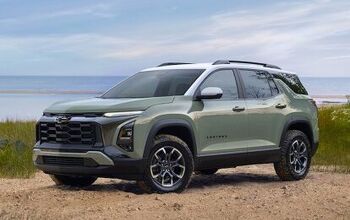Investors, Analysts: Daimler is Losing Its Way

Why did Daimler AG– already involved in aerospace, a French limousine company, synthetic fuel and (God help them) Chrysler– purchase 22 percent of Tognum AG? The German carmaker claims its €585 million investment in the fabricator of engines for agricultural threshers, military tanks and ships– makes good business sense 'cause Tognum is a major supply-chain partner. Hey, it's new tech! New markets! But wait, there's more! Under the prosaic project name "Business Innovation," CEO Dieter "no corporate diet" Zetsche has charged several high-ranking managers with finding new targets for synergy (a.k.a. whatever). Automobilwoche agrees with analysts and investors who find this acquisition strategy deeply worrisome. "There can only be one reason for Zetsche to be interested in unrelated businesses: apparently Daimler does not see enough growth prospects in its core business of making cars." The news that Daimler is getting back into its old conglomerate habit "should be alarming to any investor," says the German magazine. Looks like Daimler's ability to keep to the old adage "stick to the knitting" is coming undone.

More by Martin Schwoerer


































Comments
Join the conversation
BTW Steven, your info is highly interesting. I'd be interested in some kind of yearly review, maybe through TTAC? Robert? BTW the Parker's info is slightly skewed in one sense. Most Hyundai and Kia cars sold in the UK are sold to people spending their own money, not someone elses (i.e. they don't show up in the fleet news stats).
A company that makes 40% of its revenues from commercial vehicles makes a small (defensive?) investment in an enginemaker? I don't see that as an unrelated business or a problem. If Zetsche wasn't looking for opportunities for investment would he be doing his job? It's not like the shareholders want the money back anyway - they'd rather talk about how long the stock as been in the family.
For what it's worth, Mercedes has really started to climb in JD Power's initial quality survey. The E-class gets five stars and receives JDP's award in the Midsize Premium class, and the S-class tied with the A8 for both 5 stars and JDP's Large Premium award. The rest of the vehicles aren't there yet, but Daimler is making an effort to respond to the quality complaints. And whether the initial quality improvements translate into long-term results obviously remains to be seen.
hal and pch101, good posts. You're both right. Mercedes has effectively opted out of offering vehicles in the sub-30k segment in the North American market. At least under their own name. The quality issues were a big role in that decision along with the struggle for sales. I've driven the C-Class, and it really represents what is the core strength of the Mercedes brand. Solid, strong, durable cars with a slight sporting pretension. "One question though. When you say, “I’ve always believed that the success of a given vehicle can be measured by two criterion.”: How do you define “success”?" A 'successful' car, on average, will be a keeper for the owner. Paul Niedermeyer's Chrysler minivan (kept for 14 years), and my Toyota Camry (kept for 12 years) are two good examples. All things being equal a poorly designed vehicle will have a shorter duration of ownership, and fewer miles, than a well built one. That's why in the Carmax sample over a third of the Camry's and Accord's had 150k and were over 10 years old vs. less than 5% for the Ford Taurus.